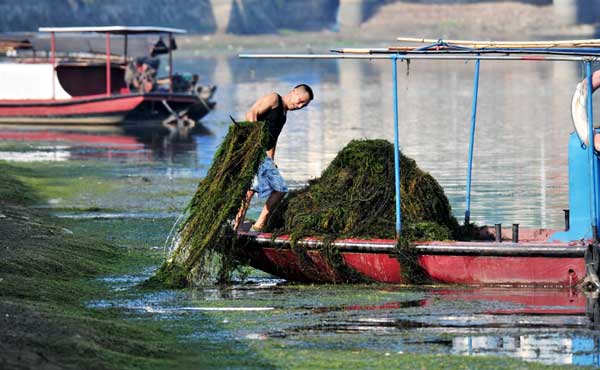Water pollution fight intensifies
 0 Comment(s)
0 Comment(s) Print
Print E-mail China Daily, April 8, 2014
E-mail China Daily, April 8, 2014
 |
|
A volunteer removes weeds from a tributary of the Yangtze River in Yichang, Hubei province, in August. The province is strengthening efforts to fight water pollution, which experts say now poses a major challenge.[China Daily] |
The provincial legislature has approved a regulation on preventing and treating water pollution, and it will take effect in July, said Zhou Hongyu, its deputy chairman and a national lawmaker.
The new regulation includes punishment for polluting enterprises and a strict accountability system for officials, Zhou said.
Companies that cause pollution will be subject to daily fines until they take measures to address the problem.
Liu Yaming, director of the Yangtze River Water Conservancy Commission under the Ministry of Water Resources, said it is important to have laws and regulations on water protection.
"The whole country considers water protection as crucially important, and Hubei province is leading the way in managing and protecting water resources with the introduction of the new regulation on water pollution," Liu said.
Protection of water resources will be made an important standard for evaluating local officials' performance to prevent any obsession with economic growth at the expense of combating water pollution, she said.
Hubei, the "Province of a Thousand Lakes", is abundant in water resources and sits on more than 1,000 km of the Yangtze River.
The province supplies water for Beijing, Hebei province and Tianjin, as well as neighboring Henan province, under the massive South-to-North Water Diversion Project.
But overexploitation, turning lakes into land for real estate development, and a lack of conservation measures have led to a sharp fall in the lakes' water levels, Zhou said.
At one point in the 1950s, there were 1,332 lakes, each with an area of more than 6.7 hectares, but the number of lakes has been halved, according to the provincial science and technology department.
Many experts said that water pollution has also become a major challenge in Hubei.
The pollution comes mainly from daily life and factory discharges, said Deng Xiuxin, president of Huazhong Agricultural University and an academic with the Chinese Academy of Engineering.
"Back in 1982, when I was a graduate student, we could see lakes all over Hubei, and they were all clean and we could swim in them. But in the 1990s, when we swam in the lakes, we got rashes on our skin because the water was polluted," Deng said.
Tang Liangzhi, mayor of Wuhan, capital of Hubei, said water protection concerns a city's sustainable development, and Wuhan, nicknamed "City of Rivers", has been making efforts to protect its water resources.
Wuhan's water regulations are among the most advanced in China, and it is the first Chinese city to implement a pilot program protecting and repairing water-based eco-systems, Tang said.
The city has had a five-year action plan for sewage treatment in its major urban areas since 2012 to ensure that all water flowing into lakes and rivers is clean, Tang said.






Go to Forum >>0 Comment(s)